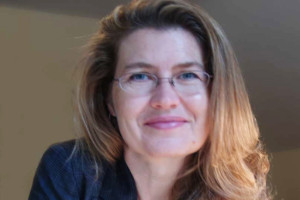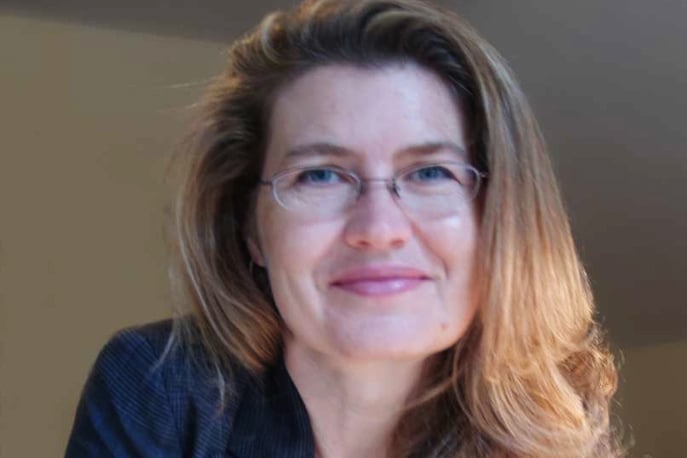The objects scattered around Jennifer Summit’s office give glimpses of the English professor’s interests. Framed medieval images embellish the walls, and on the bookshelf, nestled between volumes of Chaucer’s “Canterbury Tales,” are her own two award-winning books on medieval and Renaissance literature. A bookmark for the “What is a Reader?” project, which she directs, sits on the desk next to a folder from the Study of Undergraduate Education at Stanford (SUES), on which she serves as a committee member.
“The work that I do is about reading and writing, the history of literature, the history of books and how people use them,” Summit said. Much of her academic efforts branch out from this fascination with the trends surrounding the literary process.
Summit grew up around the Stanford campus and witnessed the great technological changes that came with the rise of Silicon Valley.
“I remember growing up as a reader at the same time computers started infiltrating Silicon Valley,” she said. “A lot of the questions I’m interested in…come out of that personal wonder about media and the difference it makes.”
As an undergraduate at Vassar College in New York, Summit started reading medieval literature and was immediately drawn in.
“[Medieval literature] blew me away because it was so resistant to change,” Summit said. “In order to make sense of it, you had to put yourself in a completely different place intellectually.”

Summit’s training in both medieval and Renaissance literature is unique among scholars, giving her a distinct perspective on early modern texts. Her research focuses on cultural change through literature. One concept that particularly fascinates her is the transition from manuscript to print culture.
“Before print culture, manuscript was a form of both personal and mass production,” she said.
With the popularization of the printing press as the prevalent mode for mass production of texts, the manuscript was relegated to being a much more personal means of communication–a change reflected in the Renaissance fascination with the individualized nature of handwriting.
The questions Summit poses in her study of early literature are recapitulated in her “What is a Reader?” project, which examines current trends in undergraduate literacy. She directs this project in collaboration with UC-Berkeley and UC-Santa Cruz. One study within the project contrasted how undergraduate students read on a physical page versus on a computer screen. This was partly in response to a similar National Endowment for the Arts study that concluded that, given new online modes of reading, undergraduate students are experiencing a crisis in literacy. Summit’s study provided a less dire conclusion.
“Page literacy seems to be good for intensive [detailed] reading, while screen literacy is good for extensive reading or skimming,” Summit said.
She argued that the transition in modes of reading, like the change from manuscript to print, does not destroy the original medium, but simply redefines it.
Summit has received many accolades for her research.
“She is among the most admired scholars under 50 worldwide in both fields [of medieval and Renaissance literature],” wrote fellow English Prof. Roland Greene in an email to The Daily.
Summit’s work has redefined the core of the English major. She was chair of the English Department when the new core was implemented, adding a core sequence of literary history.
“[She] was its author as much as anyone can be,” Greene said of Summit’s role in the new curriculum. “Her chairmanship was characterized by a deeper attention to the undergraduate curriculum, which is undoubtedly a result of her commitment to undergraduate education.”
Summit’s passion for teaching provides an outlet for her boundless ideas and energy. In previous quarters she has taught the literary history core, offering classes such as a workshop in paleography, the study of old texts, as a complement to her research interests.
“I’m really interested in developing classes on the history of reading and writing, conceived as a long history that includes the present,” Summit said.
Summit’s ability to integrate her research with her teaching impresses both students and fellow faculty.
“Her teaching absorbs her research interests very well,” Greene said. “Students get the benefit of hearing a scholar thinking on her feet about her current work.”
Bridget Whearty, a doctoral candidate in the English department and Summit’s advisee, has served as Summit’s teaching assistant.
“Jennifer [Summit] encourages me to see all the work that professors do–teaching, research and service to the University and their professional organizations–in harmony rather than in conflict,” Whearty wrote in an email to The Daily. “She is passionate about connecting her research to her teaching in ways that invite her students to share in the labor of intellectual discovery.”
For Summit, her intellectual curiosity is constantly driven by her research and teaching.
“I’m always surprised by my research,” she said. “I think that when you stop being surprised by your research, it’s time to stop.”
